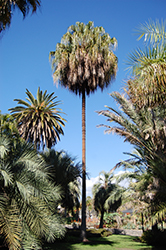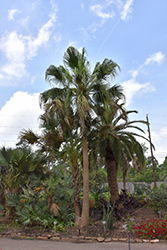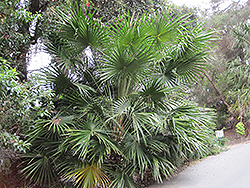Fri & Sat 8am - 8pm
Sun 8am - 7pm
Anytown, USA 12345
fax: 261.787.0463
e-mail: info@successgc.com


Plant Finder

Height: 50 feet
Spread: 15 feet
Sunlight:
![]()
![]()
Hardiness Zone: 9a
Other Names: Gippsland Palm, Cabbage-tree Palm, Fan Palm
Description:
This variety produces beautiful, deep green palmate leaves that are deeply divided, with soft tips that will sway on gentle breezes; a nice tropical screen when young, but will ascend on a tall single trunk in time; a visually stunning landscape accent
Ornamental Features
Australian Cabbage Palm is primarily valued in the landscape for its canopy of attractive foliage which towers high above the ground. It features subtle panicles of buttery yellow flowers held atop the branches in mid spring. It has attractive dark green evergreen foliage. The glossy lobed palmate leaves are highly ornamental and remain dark green throughout the winter. The rough khaki (brownish-green) bark adds an interesting dimension to the landscape.
Landscape Attributes
Australian Cabbage Palm is an evergreen tree with a strong central leader and a towering form, with a high canopy of foliage concentrated at the top of the plant. Its average texture blends into the landscape, but can be balanced by one or two finer or coarser trees or shrubs for an effective composition.
This tree will require occasional maintenance and upkeep, and usually looks its best without pruning, although it will tolerate pruning. It has no significant negative characteristics.
Australian Cabbage Palm is recommended for the following landscape applications;
- Accent
- Vertical Accent
- Hedges/Screening
- Container Planting
Planting & Growing
Australian Cabbage Palm will grow to be about 50 feet tall at maturity, with a spread of 15 feet. It has a high canopy of foliage that sits well above the ground, and should not be planted underneath power lines. As it matures, the lower branches of this tree can be strategically removed to create a high enough canopy to support unobstructed human traffic underneath. It grows at a medium rate, and under ideal conditions can be expected to live for 80 years or more.
This tree does best in full sun to partial shade. It prefers to grow in average to moist conditions, and shouldn't be allowed to dry out. It is not particular as to soil type or pH, and is able to handle environmental salt. It is somewhat tolerant of urban pollution. This species is not originally from North America.
Australian Cabbage Palm is a fine choice for the yard, but it is also a good selection for planting in outdoor pots and containers. Because of its height, it is often used as a 'thriller' in the 'spiller-thriller-filler' container combination; plant it near the center of the pot, surrounded by smaller plants and those that spill over the edges. It is even sizeable enough that it can be grown alone in a suitable container. Note that when grown in a container, it may not perform exactly as indicated on the tag - this is to be expected. Also note that when growing plants in outdoor containers and baskets, they may require more frequent waterings than they would in the yard or garden.


